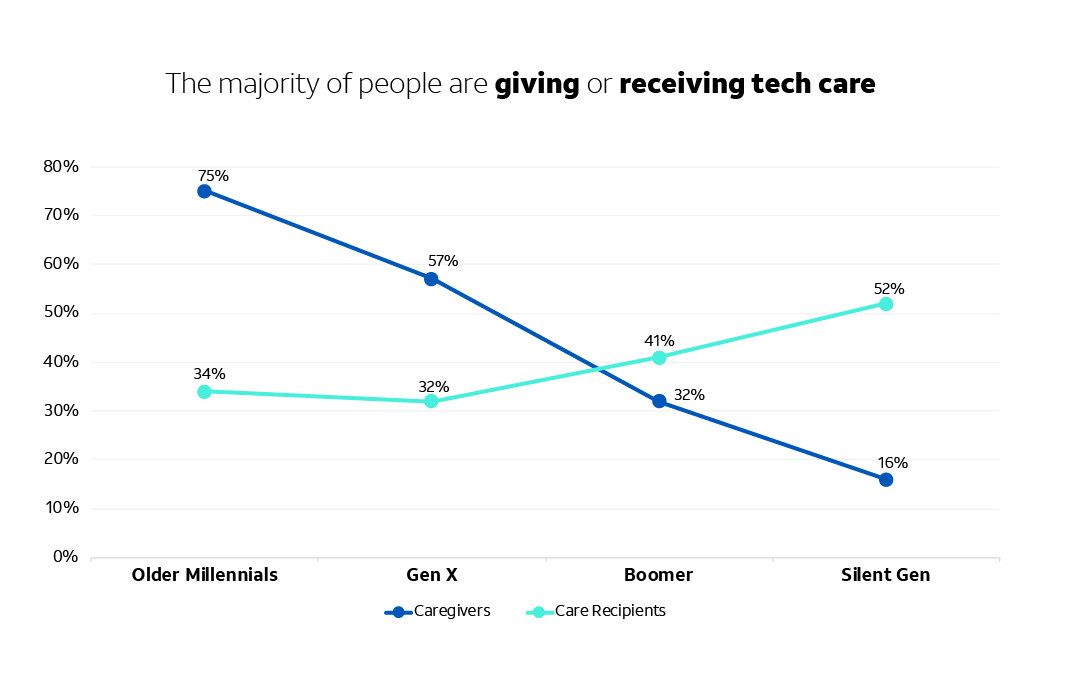Cybersecurity Awareness Month
Get Cyber Safe During National Cybersecurity Awareness Month
How cybersecure are you?
It’s a good time to ask the question. October is National Cybersecurity Awareness Month.
Odds are good you can do more.
New research done for AT&T* shows people of all ages are not using best practices to stay safe online and protect themselves from fraud.
AT&T’s cross-generational survey checked out how much people knew about the best online safety practices. It also looked at how often they were getting hit with frauds and scams, and what steps they are taking to protect themselves and loved ones.
Key findings include ways that the generations are the same, and ways they are different.
Where generations are the same:
- About 90% across generations have experienced a scam that tries to “phish” for their personal information, such as a suspicious email or robocall.
- About a quarter of people across generations have discovered a virus or malicious software on one of their devices.
- The majority of people give or receive help on tech from those close to them. Younger adults get help from friends and significant others. Older adults (those who are 60+) get help from their children. “Tech caregiving” is an important social trend.

Tech Caregivers and Tech Care Recipients
Showing % of Total Audience
Caregivers: identify as those who provide assistance with navigating technology to family or loved ones
Care Recipients: identify as those who receive assistance with navigating technology from family or loved ones.
Where generations are different:
- Adults in their 70s and older are nearly twice as likely as people in their 30s to have experienced the “fake technician” scam, where someone calls and wants access to your computer to run a “security scan.”
- Older adults lag behind younger ones in using “two-factor authentication.” That’s when a text or email is sent to confirm an account log-in. Only a quarter of people who are 60 or older use 2FA, compared to nearly 40% of people in their 30s.
- Younger adults are not leaders in every category. They trail their elders on password safety. 60% of people who are 60 or older use different passwords for different accounts, compared to 41% of people in their 30s. The younger adults also use personal information in their passwords twice as often as the older adults.
AT&T can help you test your cyber smarts and learn how well your accounts, devices and information are protected online.
Take the Cyber Aware Quiz and learn how to fight back against cybercrime. AT&T Cyber Aware is a central location for resources and insights to help people of all ages learn how to be safer online.
Content includes topics such as:
- 5 easy tips to protect yourself from fraud
- How to stop catfishing before they trick you
- Best practices with passwords and how to make them stronger
- How to identify if an email is safe, scam or spam
- How to be a great “tech caregiver”
AT&T Cyber Aware is on the road through the end of this year helping more older Americans protect themselves online. AT&T and the Oasis Institute are hosting technology training across the US to help people outsmart the bad guys and stay safe online.
*AT&T completed a survey of 1,502 respondents segmented by generation (499 Older Millennials age 30-38, 501 Generation X age 39-54, 250 Boomers age 60-72, 252 Silent Generation age 73-90) from Aug. 21, 2019 through Aug. 30, 2019.



